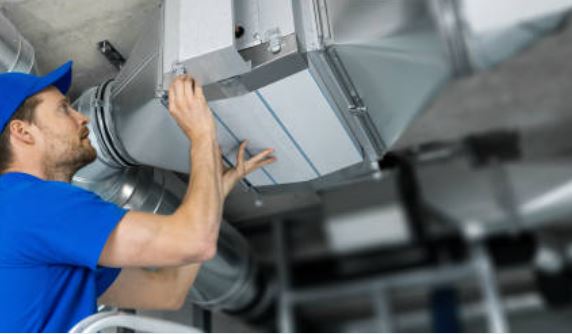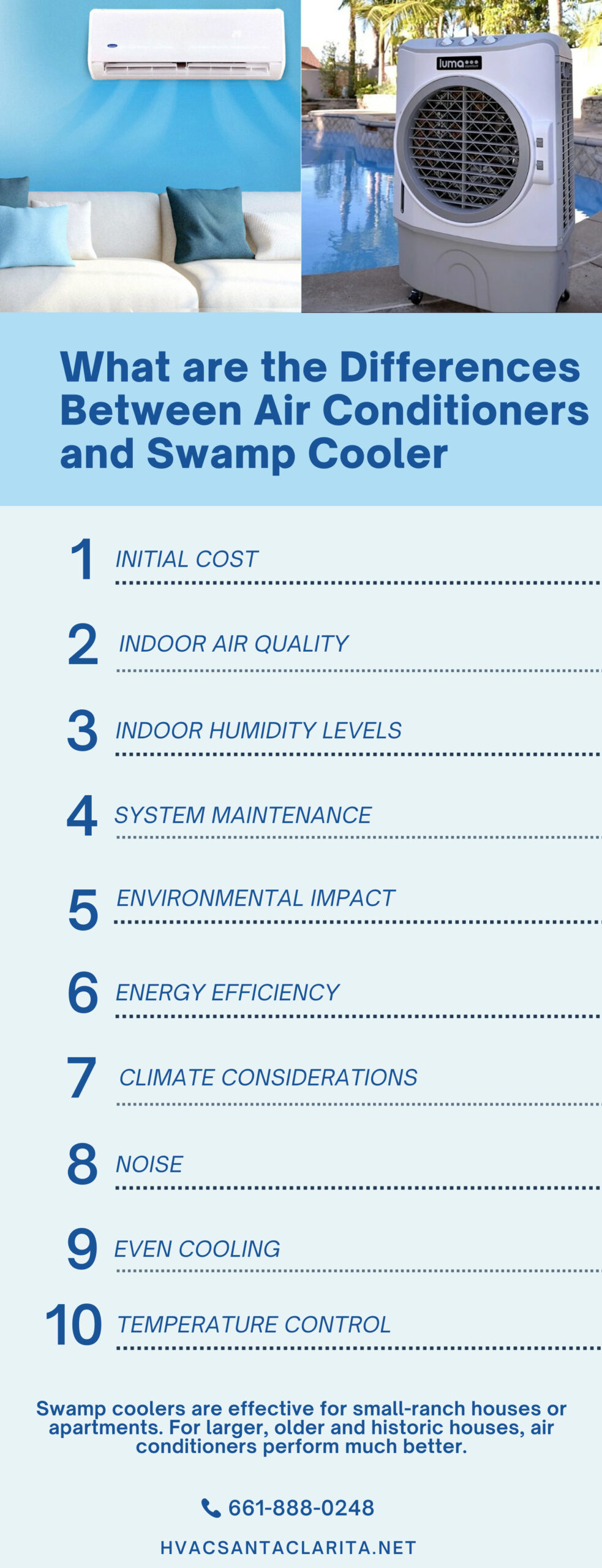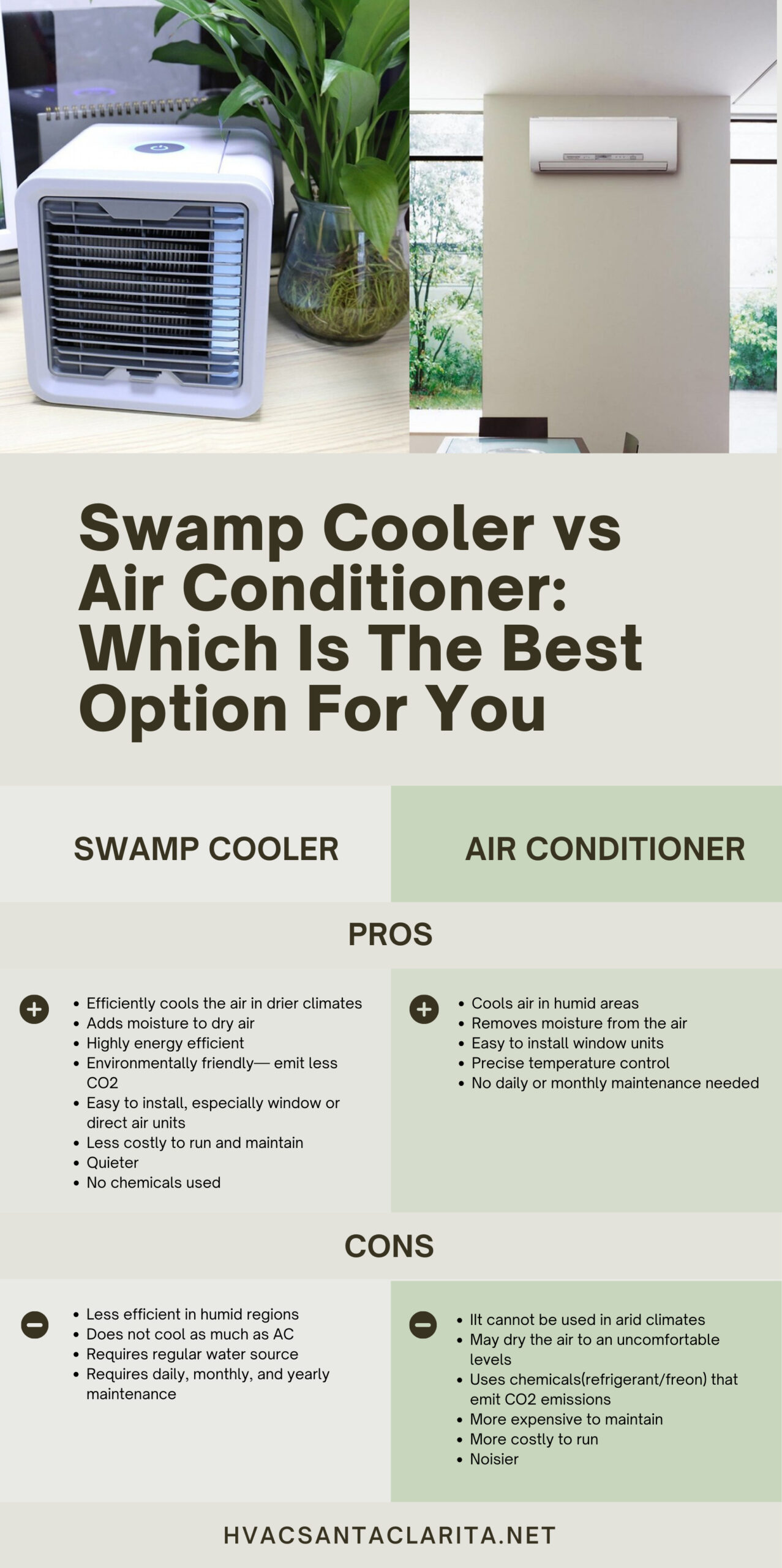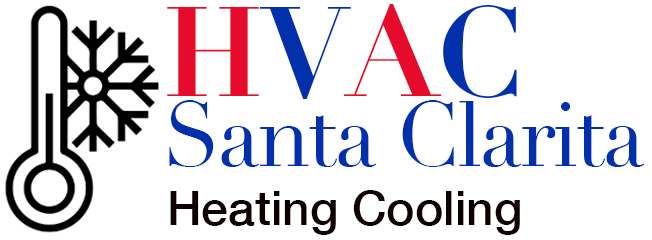Which is better: swamp cooler vs. air conditioner?
This is a common inquiry, especially now that summer is here.

call 661-888-0248
Contact us 24/7 for HVAC services!
So, which is the cooling capacity of these two?
Is a swamp cooler better than an air conditioner? Or is the other way round accurate?
What are the differences between these two cooling gadgets?
We look into the features of a traditional air conditioner vs a swamp cooler.
Let us get straight into business.
Swamp Coolers vs Air Conditioners: How do they Work?
If you live in a moderate environment, you can choose between AC vs swamp cooler.
However, how do you choose what suits you best?
Well, they are all cooling gadgets, and that is all that matters, right?
Unfortunately no.
There are some distinct differences you need to know, especially in their performance.
Whether you are using a portable air conditioner, a window air conditioner or a central AC unit, they all have the same working principle. They use a liquid called freon or refrigerant to absorb heat from the indoor air. The liquid then releases the heat outside. The result is usually less humid and cool air.
The air conditioners also come with filters that trap dust particles and other debris. Through this, they improve the general indoor air quality.
How Does a Swamp Cooler Work

Note: A swamp cooler is also called an evaporative cooler.
They use a cooling principle that we will call evaporative cooling.
Through evaporative cooling, swamp coolers use water in place of a chemical refrigerant. That is the main difference between the two.
The cooling process of a swamp cooler involves air blowing over a wet pad. The moisture from the wet pad then evaporates into the air. This cools the air and also adds some moisture to the air.
Do you notice that difference? An air conditioner eliminates some moisture from the air, while evaporative coolers add humidity to the indoor air. This is the most crucial factor you should always consider while making an AC unit vs. swamp cooler comparison.
What are the Differences: Swamp Cooler vs Air Conditioner

We do a swamp cooler air conditioner head-on below. These are important factors that you should have in mind while choosing.
By the end of this, we are convinced that you will be able to answer the common question we receive, “which is better swamp cooler vs air conditioner?‘
Let’s go!
Initial Cost
Cost is always a vital factor when buying anything, not just air conditioners or swamp coolers.
However, on this note, a swamp cooler is cheaper than an air conditioner in terms of the upfront costs.
If you choose to go with a swamp cooler or an evaporative cooler, you may spend around $500. That is a very friendly budget for a cooling gadget. However, to install an air conditioner unit, you will spend a couple thousands, depending on the brand, model and size of your AC unit.
The cost is even higher for air conditioning installation if you need to install ductwork. It is much simpler if you already have existing ductwork. Good thing is when you need AC replacement, it would be cheaper because you already have ductwork.
Our judgment: If you have a low upfront budget, go for swamp coolers.
Indoor Air Quality
While in your house, you want more than cool air in summer. You want fresh air too. And if fresh air is your priority, go for a central air conditioning unit or portable air conditioners. They offer much better indoor air quality than swamp coolers.
Air conditioning units come with air filters that trap pollen, dust, dirt and pollutants. You have to ensure you have clean air filters, and your air quality will be top.
Our judgment: If you have people with allergies or you live in a dusty area, go for an air conditioner.
Indoor Humidity Levels
Do you have trouble with high humidity levels? If yes, you are better off buying an air conditioner and not an evaporative cooler.
However, now that we are here, we would like to point out that it is entirely a personal preference. If you have high humidity issues, you want your cooling gadget to remove some of it rather than add it to the air.
If you detest the high humidity, you are better off with an air conditioning unit and maybe a dehumidifier as a supplement.
If you have no issue with humidity, swamp coolers will work well for you.
Our judgment: If you live near a large water body such as a lake or the ocean, go for an air conditioner. You don’t want to keep adding more moisture to your already humid environment. However, if you are in a dry climate such as a desert, you would benefit from the humidity a swamp cooler adds to the air.
System Maintenance
Both swamp coolers and air conditioners need maintenance to keep functioning well.
You need to change your air filters or clean them at least once in three months for an air conditioner. You also need to have regular AC maintenance from your local HVAC expert.
On the contrary, a swamp cooler needs weekly cleaning. Spare at least an hour weekly to clean your cooler. Your swamp cooler may quickly develop issues if you have no time for weekly cleaning.
However, it is much cheaper to service and maintain a swamp cooler than an air conditioner. Yearly maintenance of an evaporative cooler can cost $100(1), while that of an AC unit can sometimes go up to $2000.
And, with this, there is still a variation with the single stage vs two stage air conditioner. This is because two stage air conditioners are a more complex technology. Their repairs and maintenance, therefore, generally cost more than single stage air conditioners.
Our judgments: both systems need constant servicing and maintenance. A swamp cooler may need more frequent cleaning, though it is cheap. You need to have a budget for your air conditioning check-up, repairs and maintenance.
Environmental Impact
Well, swamp coolers and air conditioners do a good job of cooling us.
However, have you asked yourself what impact these cooling gadgets have on the environment?
As much as modern refrigerants are safer than those from several decades ago, they are not 100% safe. You, however, do not have to worry about this as the refrigerant is enclosed in the system; the only issue comes in when there is a refrigerant leak, which is much more common than people know. And, many times, it goes unnoticed.
If there is a refrigerant leak from your air conditioning system, there is a potential danger to you and your home.
You have to know that refrigerants are not as safe. It is good that modern-day refrigerants are safer than past versions. This, however, does not make it 100% safe. If it leaks out of your system, it can potentially be harmful to you and your home.
Air conditioners release much more CO2 into the atmosphere than evaporative coolers. Evaporative coolers use electricity and water to cool your house, which has minimal environmental effects.
Our judgment: If you want to be more eco-friendly, go for swamp coolers. They are more gentle to the environment.
Energy Efficiency
Swamp coolers use roughly 35% of the energy needed to power the same size AC unit(2). They, however, require a constant supply of water to keep functioning. You, therefore, want to avoid them if you experience water shortages.
Our judgment: If you live in a dry and less humid environment, swamp coolers will be a good choice for saving energy.
Climate Considerations
As you may already have figured out, swamp coolers are great for hot and dry climates; say in a desert. They add some moisture to the air, which will come in handy if you live in a dry area.
Evaporative coolers are not great for the humid environment as they will result in excess humidity and mildew and mold growth.
Air conditioners work well in almost every climate. However, if you are already in a dry climate, they will dry the air more. Dry air causes eye and skin problems.
Our judgment: Go for a swamp/evaporative cooler if you live in a dry environment and an air conditioner if you live in a more humid and wet environment.
Noise
The amount of noise of both the cooling gadgets will vary from one brand and model to another. It is possible to find relatively quieter models for both.
However, swamp coolers are generally quieter than portable and central AC units. Most of the noise escapes outside from a window AC unit, making it more silent.
Note: You have to know what a normal functioning AC sounds like. If your AC is making weird noises, you need to call for AC unit service.
Our Judgement: If you are looking for a silent gadget that won’t bother you with noise, go for a swamp cooler or a window AC unit.
Even Cooling
How cold air circulates throughout the home is another significant difference between swamp cooling and central cooling.
For swamp coolers, there is usually no connection to ductwork. The cold air moves through the home through the changes in pressure. If you keep the windows cracked in each room, the cool air flows and forces the warm air out.
The disadvantages of this motion include:
- Lower cooling capacity for larger homes. If you have a huge home, this motion may not provide enough cooling as you may want.
- Reduced cooling downstairs or upstairs. If you have a two-story home, you are better off buying two swamp coolers; a swamp cooler for each floor. If you have one cooler, one floor will not be as cool as the other.
- Minimal effectiveness in closed-room designs. If your house does not have an open floor plan, cooling with a swamp cooler will be challenging.
- Need to keep doors open. Sometimes, to keep rooms cool, you may need to keep rooms open to allow air to flow freely. This can be limiting; for instance, you cannot close your bedroom door at night to let in cool air.
Our judgment: Swamp coolers are effective for small-ranch houses or apartments. For larger, older and historic houses, air conditioners perform much better.
Temperature Control
You can set your thermostat to the temperature you prefer with central air conditioning. For instance, if you like it cooler, you can go for 65 degrees or 78 degrees if you like it warmer. The choice is up to you.
A swamp cooler does not come with this benefit. A swamp cooler struggles to cool the air if the temperatures outside hit more than 100 degrees. The coolers work well when the air through them is arid and warm. Therefore, you may lose the cooling benefit whenever it rains.
Pros and Cons of Swamp Cooler vs Air Conditioner

We list quick pros and cons of these two cooling gadgets. We hope these help you choose what is best for you.
Pros of a Swamp Cooler
- Efficiently cools the air in drier climates
- Adds moisture to dry air
- Highly energy efficient
- Environmentally friendly— emit less CO2
- Easy to install, especially window or direct air units
- Less costly to run and maintain
- Quieter
- No chemicals used
Cons of Swamp Cooler
- Less efficient in humid regions
- Does not cool as much as AC
- Requires regular water source
- Requires daily, monthly, and yearly maintenance
Pros of Air Conditioners
- Cools air in humid areas
- Removes moisture from the air
- Easy to install window units
- Precise temperature control
- No daily or monthly maintenance needed
Cons of air conditioners
- It cannot be used in arid climates
- May dry the air to an uncomfortable levels
- Uses chemicals(refrigerant/freon) that emit CO2 emissions
- More expensive to maintain
- More costly to run
- Noisier
Swamp Cooler vs Air Conditioner Frequently Asked Questions

We answer some FAQs on evaporative cooling and air conditioning below. We hope that these will cover additional inquiries you could still be having. If not, a simple search for “HVAC near me” will put you in contact with your local HVAC contractor.
Is AC or swamp cooler better?
It is complicated to rule out one as being better than the other. An air conditioner is better in a humid and wetter environment, while a swamp cooler is better in less humid and drier climates.
Is it cheaper to run a swamp cooler or AC?
Yes, it is way cheaper to run a swamp cooler. A swamp cooler consumes less than half the energy consumed by an air conditioner.
Can a swamp cooler cool an entire house?
This will depend on the type of house you have. If you live in a smaller ranch house or bungalow or an apartment, a swamp cooler will work well for you.
If you live in a story house, you will not enjoy proper cooling unless you have a swamp cooler for every floor.
Do swamp coolers work in high heat?

You should know that swamp cooler cools by sometimes only 15 degrees(3). Their efficiency may slow down when the temperatures and humidity increase.
Can a Swamp cooler work all day?
Yes, a swamp cooler can run for 24 hours. However, if it is manual, you will need to keep adding water to ensure it is functioning well consistently. You are good to enjoy 24-hour cooling if you have an automatic swamp cooler connected directly to a water reservoir.
Does putting ice in a swamp cooler help?
Putting ice in your swamp cooler can reduce its effectiveness. The faster the water evaporates in the evaporative cooling process, the faster and more efficient the cooling process. Therefore, adding ice will slow down the process. The warmer the water, the better.
Can swamp coolers cause pneumonia?
If you maintain your AC well, you will not have to worry about this. Swamp coolers produce no aerosols, therefore, will transmit no diseases.
Final Thoughts on Swamp Cooler vs Air Conditioner

It is our time to call it a wrap for swamp cooler air conditioner comparison.
At this point, we do not doubt that you know what is suitable for you.
However, we cover you below if you have had no time to read it all through.
Go for a swamp cooler if you live in a low humid and dry area. If you live in a wetter and humid area, an air conditioner will work well. The other differences and factors will revolve around the climatic considerations.
If you have any more inquiries, we will be more than happy to answer them.

call 661-888-0248
Contact us 24/7 for HVAC services!
Sources
https://home.howstuffworks.com/home-improvement/heating-and-cooling/swamp-cooler.htm
https://www.nytimes.com/wirecutter/blog/do-swamp-coolers-work/
https://en.wikipedia.org/wiki/Evaporative_cooler
